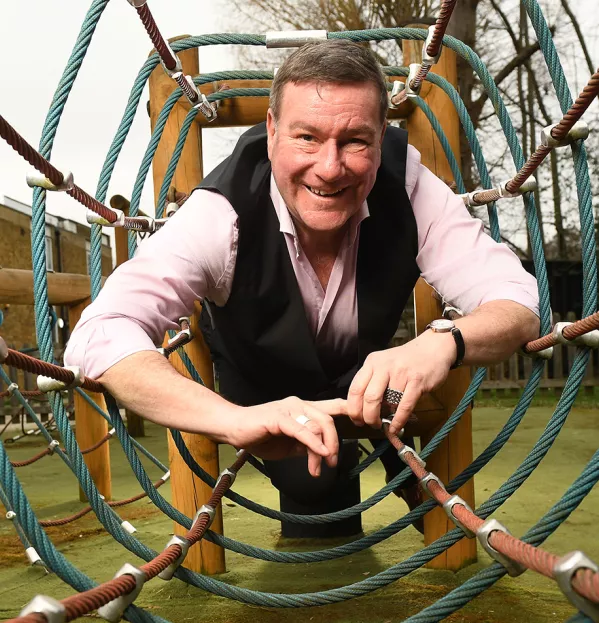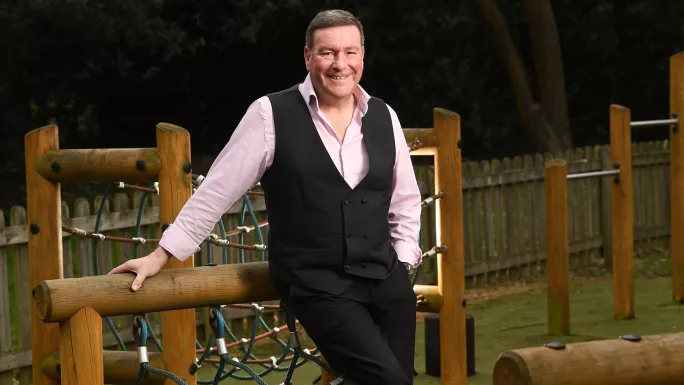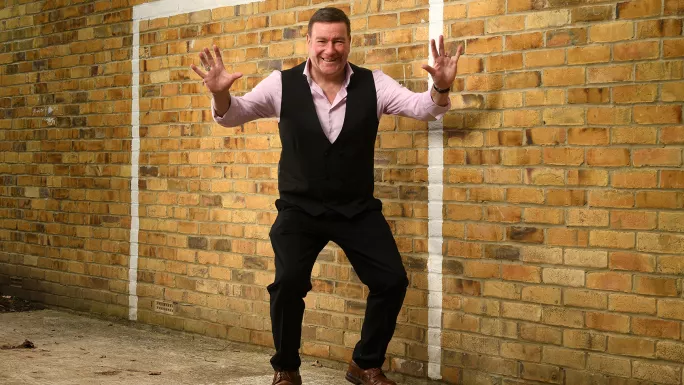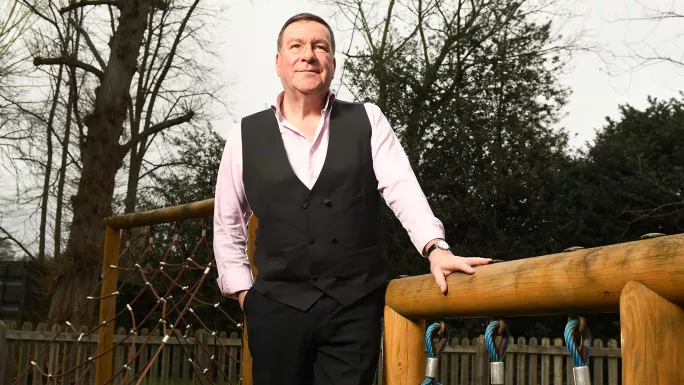- Home
- Leadership
- Strategy
- 10 questions with... Jonty Clark
10 questions with... Jonty Clark

Dr Jonty Clark is the CEO of The Beckmead Trust, a multi-academy trust formed of 11 special and alternative provision schools in Croydon, East Sussex, Essex, Brent and Richmond that work exclusively with children with special educational needs or disabilities (SEND).
He spoke to Tes about why his experiences in school inspired him to fight for a better experience for future generations, why mainstream schools have to step up, and why Bruce Springsteen would be “the boss” in his ideal school staff room.
1. Who was your most memorable teacher at school and why?
Well, I remember Ms Cook and Mrs Cave as my first two teachers at primary school, and I remember them being kind and helping me through some difficult times.
Unfortunately, after that, I haven’t really got any favourites. I didn’t really engage with anybody and nobody really engaged me as being kind or interested or empathic.
I struggled at school and the teachers weren’t what I was expecting from people who wanted to work with children.
I think I caught Second World War veterans who’d gone into teaching and were dissatisfied - the level of aggression and violence and bullying in schools was just unbelievable and kids replicated that behaviour because they saw the big people behaving like that.
2. What were the best and worst things about your time in school?
I really hated it. I’m sure lots of that was my fault and I was difficult and didn’t go very much, and just walked around playing hooky, which didn’t get picked up. I kind of lost myself really.
There were some elements that were positive. It certainly broadened my appreciation and appetite for literature and I enjoyed and learned a variety of sports, and that’s been a positive all my life.
3. Why do you work in education?
I didn’t want to think of children as being as unhappy as I was at school.
But also, for me, it was always about special education and I always had a really keen interest in difference and disability. At a young age, I used to volunteer for the Stoke Mandeville Games, which was a very primitive precursor of what is now the Paralympics Games.
SEND schools are so layered with home visiting and multi-agency work that what goes on in the classroom is only a fraction of that but when we support a family to upgrade their living accommodation, register with a doctor’s surgery, anything to become better agents for their outcomes, it always interests me.

On one hand, it makes me angry that we work with people who are discriminated against, because of their social circumstances, their family histories, the way they look - that still gets me out of bed angry.
But when you’re working to try and help those families build resilience as well as breaking cycles, it’s a great place to be and, at 59, I’m as passionate about that as when I was 13 and started volunteering.
4. What are you proudest of in your career? And what do you regret?
I’ve been responsible for a number of schools that have gone from grade four to grade one - schools that people had given up on - and seeing a school that children are happy to come to every day, and staff love coming to work at every day, that journey is unbeatable.
There is also a specific bit of work I did in a school I was responsible for in Tooting, which was opening Tom’s Farm.
Tom ap Rhys Pryce was a young lawyer who was murdered by one of my pupils and an associate of his. We partnered with Tom’s family and did a long piece of work with them about disadvantage and trauma and, in partnership with the charity Tom’s Trust, we converted some acres of wasteland adjacent to the school into a farm called Tom’s Farm, which is thriving today, and that’s made a difference to a lot of children’s experience.
So I feel proud really of being a part of that family’s journey to some kind of understanding and some kind of contextual handle on the awfulness that happened in their lives.
I’m also really proud of the fact some of our substantive headteachers started with us over 20 years ago as teaching assistants. We taught them to be teachers, then to be great middle leaders, senior leaders and now fantastic substantive headteachers.
The regret is having a lack of confidence sometimes to stand up to some regulators and some mediocre local authority input in various boroughs when I knew better for our kids. It’s been a while since that’s happened but I regret that because I think if I’d been stronger, there would have been better outcomes.
5. Who would be your colleagues in your perfect school staffroom?
Firstly, Bruce Springsteen - for his music, of course, but also just someone who is really motivating - and then also Steve van Zandt. We have a partnership with his charity, TeachRock, and he’s really thinking outside the box on curriculum and pedagogy and doing something about it.
I’d have Stuart Roden, who’s a trustee of ours, he’s a Times Top 500 leader and really shows how to mix business brilliance with kindness. He’s an inspiration to me.
Judith Azzopardi, who is the queen of autism, who translates behaviour and communication difficulties into something we can all understand and work with, which is awesome.
Linda Wright, who’s one of our trustees, was a local authority officer in Croydon before she retired, she genuinely produces systems with children’s outcomes at the heart.

All of our headteachers, who somehow, every day - and this isn’t as easy as it sounds - turn up and love children with social, emotional and mental health needs, all day every day. And that is leadership beyond one’s dream.
And definitely my executive team now, who have worked miracles to get us to where we are, which I think is the launch pad. So it’s a big staff room!
6. What would you say are the best and worst aspects of our school system today?
Best - I think that academies have transformed education in the metropolitan areas. I’m old enough to remember terrible schools where 5 per cent of the kids would come out with something meaningful and that has been transformed for 95 per cent of kids.
I think the worst thing is that 95 per cent needs to become 99 per cent and the mainstream has to rescue the special sector.
We’re getting too many kids through who we shouldn’t have through event-linked trauma - so, for example, dad turns up after a year, dad hits mum, and leaves again, which is awful.
But that shouldn’t mean the child enacting that trauma in school should be out of the mainstream because three months of really good work should sustain that child - because once they’re out, it’s really difficult to get them back in and they don’t want to go back.
We’ve got to be really careful that great special schools aren’t a social interaction because life isn’t like this. Life isn’t being in with six friends with three adults who love you dearly, we have to promote resilience and stuff like that.
I think there’s the will in mainstream schools to look after our kids, but they haven’t got the resource or the expectation from our “masters” to do that and that’s wrong.
7. Who in education has influenced you the most?
Paul Greenhalgh - as director of children’s services when I came to Croydon - is someone who is strong, principled, empathic and inclusive. It was inspirational working for him.
Professor Pat Sikes at Sheffield University, who was my doctoral supervisor. I support inclusion 100 per cent but, too often, it’s an unrealistic aim. Pat absolutely nailed a balance of inclusion with the realism of working in an operational centre in education.

Finally, for me, the bible for attachment and nurture is Building the Bonds of Attachment by Dan Hughes. I refer hundreds of people to his book because it’s accessible, it’s plain, it’s written as a story and it shows what we need to do and how we need to look after school children. So, it’s a massive influence.
8. If you became education secretary tomorrow, what would be the first thing you do?
Unite Ofsted and the Department for Education so there’s one hymn sheet that we need to sing from, that would be very helpful indeed.
And building really on the work of Brahm Norwich, I would depoliticise the DfE, which I know would probably do me out of a job as secretary of state, but building on Brahm’s work I would say: “Okay, we’ve got 20 education professionals, we’re going to decide some strategic objectives for the next 20 years and that’s where we’re going.”
We’re not going to zigzag from political confection to political confection, “Oh I like post-16” or “I like phonics”, we get rid of the politicians and have it run by professionals.
9. What will our schools be like in 30 years?
What I hope they will be like is having sustainability at the forefront - our kids, with such narrow experiences, shame us as a generation with their knowledge of the challenge of sustainability.
I also hope to see more emphasis on communication skills and relationships, and employment-based courses, because that is the future and, together, will keep this planet going.
10. What are the most important lessons you’ve learned from doing this job?
Schools have to be founded on equality, which I hope is the difference between Beckmead schools and what I experienced.
I’ve learned also that kindness and humility can reach the most marginalised and disadvantaged people and kids know much more than we think they do.
Finally, I think the other thing I’ve learned is that finding half an hour to listen now saves you four hours tomorrow.
Jonty Clark was talking to Dan Worth
You need a Tes subscription to read this article
Subscribe now to read this article and get other subscriber-only content:
- Unlimited access to all Tes magazine content
- Exclusive subscriber-only stories
- Award-winning email newsletters
Already a subscriber? Log in
You need a subscription to read this article
Subscribe now to read this article and get other subscriber-only content, including:
- Unlimited access to all Tes magazine content
- Exclusive subscriber-only stories
- Award-winning email newsletters
topics in this article



